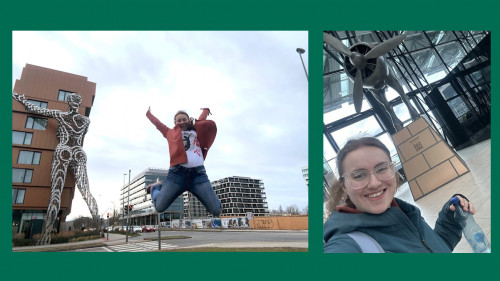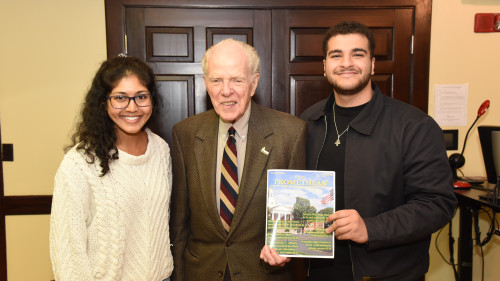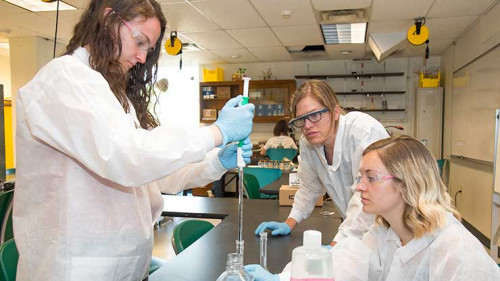

An interest in the plight of refugees that grew from a semester abroad in Berlin led Jenna Kersten ’17 to design an entire English course around how refugees are portrayed in literature.
Kersten, who graduated with a degree in English with minors in German and international studies, said her passion for social justice was enhanced when she spent a semester in Berlin during her junior year. The refugee crisis was then at its peak, as those fleeing Syria, Sudan and other strife-torn nations streamed into Europe seeking safety, shelter and the start of a new life. She volunteered with refugee organizations, which exposed her to the plight of those seeking asylum and led her to think how concerned people can best help them.
“What is our responsibility to refugees? Is it enough to provide physical comforts such as food and shelter, or should we work to fundamentally change political systems so we don’t have a refugee crisis in the first place? Or should we do both?” she asked.
To that end, she developed the English course “Literature and the Refugee Crisis: Narratives of Home” with Dr. Keith Wilhite, associate professor of English. The class examined themes relating to home, identity, exile and displacement in works of fiction, non-fiction and poetry.
“America has a mixed history of supporting refugees,” she explained. “I thought it was important for people to examine this issue in depth, instead of letting a soundbite stand in for a fuller understanding.”
She said the Franciscan commitment she learned at Siena of listening to others and getting to know people as individuals “has shaped the way I approach any activity.”
When Kersten, a Buffalo-area native, was looking at colleges, she was pretty sure she’d major in English, perhaps to become a professor who taught and studied Hemingway. She first heard of Siena from her high school gym teacher, Mrs. Lynch, whose daughter went here.
“She used to wear a Siena sweatshirt to gym class,” she said.
In the Small World Department, it turns out that Mrs. Lynch is the sister of Br. Edward Coughlin, O.F.M., Siena’s current president, who was not yet on the Loudonville campus when Kersten was deciding where to spend the next four years of her life.
After looking at several small, private colleges in New York and Ohio, she came to Siena for a Presidential Scholars visit and sat in on a British literature class taught by the late Prof. Mary Fitzgerald-Hoyt.
“They were discussing a poem I liked, [William] Blake’s ‘Songs of Innocence and Experience,’ and that class sealed the deal. I wanted more of that. I just fell in love with Siena.”
Kersten participated in an array of activities while at Siena: resident assistant, a tutor at the College’s Writing Center, and working with local refugees in a writing partnership among other efforts. She was a Dake Fellow with the Academic Community Engagement (ACE) office, and continues to work with ACE this summer as part of their Summer Service Scholars program.
“I developed great friendships, I really got engaged in the classroom, I learned from terrific professors, and I developed a passion for social justice issues,” she said.
The refugees in literature course she designed with that passion in mind examined such texts as Dave Eggers’ “What is the What,” which traces the life of one of Sudan’s “Lost Boys.” They also discussed “More: A Novel” by Hakan Gunday, one of Turkey’s leading underground writers, among other works.
Prof. Wilhite said, “People in refugee camps are searching for a sense of commitment and belonging, which are essential aspects of the human condition. The literature explored in the course allowed the students to develop a sense of empathy – one of the great things literature allows for.”
This sense of empathy was further developed through a special community outreach project created by Kersten. As a Dake Fellow, she interviewed refugees from various nations who had settled in the Albany area. Her classmates helped transcribe these interviews into personal narratives to fit on the back of a small card. On the front of the card, the refugee whose story was told created a painting. These were displayed and sold at a fundraiser at Capital Rep in March to raise money for the Refugee and Immigrant Support Services of Emmaus (RISSE).
“The students heard a lot of personal detail from the refugees,” said Kersten. “Many of them had been through horrific experiences. Going into this project, we had some sense of what a refugee was, but hearing all the details of their lives helped us grasp who the real people are underneath.”
Prof. Wilhite and Kersten said that many people tend to conflate immigrants and refugees. Where one comes voluntarily to a new country to seek economic opportunity or more personal freedom, the other is fleeing violence and terror.
“We need to see these refugees as real people,” she said. “We’re more alike than we are different. We all want a home, and a sense of belonging.”
Kersten is heading back to Germany in September as a Fulbright scholar, to teach English at the elementary or high school level. After that, she will apply to graduate school, possibly for a master’s in teaching English as a second language or in the interdisciplinary field of migrant studies or human geography. Long term goals could involve teaching or working in the non-profit sector.
“My experience here was better than I had anticipated,” she said. “I underestimated the impact the College would have on every part of my life; personally, socially, academically. I never thought about how much Siena’s mission would become a part of who I am.”

